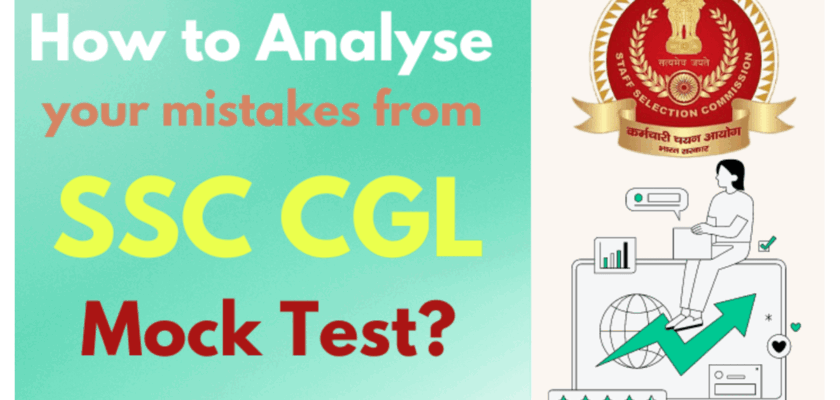The Staff Selection Commission has announced the dates for the Combined Graduate Level (CGL) Examination, which will be held from September 9th to September 26th, 2024 for 17,727 vacancies. In these last days Mock tests are crucial for SSC CGL exam preparation, but remember, the true value of a mock test lies in the insights you gain from the analysis, not just the final score. By taking the time to carefully review your performance, you can develop a more effective exam strategy and increase your chances of success in the SSC CGL exam. This article will guide you through the process of conducting a thorough mock test analysis to maximize your SSC CGL exam performance.
How to Analyse Mock Test?
After Attempting a Mock Test try to analyze which topics you struggled with, what types of questions caused you the most trouble, and where you lost the most time. This in-depth analysis will help you identify the specific areas you need to work on, allowing you to create a targeted study plan.
Timing is Everything: Creating a test-taking routine that mimics the actual exam conditions is crucial for effective preparation.
- Schedule your mock tests at the same time as your actual exam shift.
- Sit for 20 minutes before starting the test to set your biological clock.
- Complete the test in the allotted time, usually 1 hour.
- Take a 10-minute break after the test.
- Begin your analysis within 10-15 minutes of completing the test.
Question Segregation: A detailed segregation of questions helps in identifying patterns and areas of improvement.
- Categorize questions based on difficulty level and your performance.
- Identify questions where you made silly mistakes or misread the instructions.
- Pay special attention to questions where you took more time than average.
Subject-wise Analysis: Each subject in the SSC CGL exam requires a unique analysis approach., we have created the tips for subject wise analysis for every section follow them for effective analysis.
a) Quantitative Aptitude:
- Identify topics where you consistently struggle.
- Note down formulas and shortcuts for quick recall.
- Practice at least 20 similar questions for each topic in which you make error.
b) Reasoning:
- Recognize pattern-based questions that frequently appear.
- Note down your approach to solving each type of reasoning question.
- Check if you’re allocating appropriate time to different types of reasoning questions.
- For numerical reasoning, practice mental math techniques to speed up your problem-solving.
c) English Language:
- Grammar Rules: List grammar rules that you frequently forget or misapply.
- Vocabulary Building: Note down unfamiliar words encountered in the test and their meanings.
- Focus on areas where you lose marks consistently.
- Create a list of commonly asked questions or topics.
d) General Awareness:
- Look for trends in the types of GK questions asked. SSC often follows patterns in their question selection.
- Create a timeline of important events, especially those that appeared in the mock test.
- Identify areas of static GK where your knowledge is lacking.
Time Management Analysis: Time management can make or break your SSC CGL performance. Here’s how to analyze and improve it.
- Review questions where you spent more time than average.
- Identify the reason for the delay (lack of concept clarity, calculation errors, etc.).
- Develop strategies to tackle similar questions more efficiently in the future.
Error Analysis: A thorough error analysis is crucial for improvement. given below are the tips for categorization of analysis.
- Categorize your errors (conceptual misunderstanding, calculation mistakes, time management issues).
- Solve all the questions you got wrong without looking at the solutions first.
- This process helps reinforce correct approaches and boosts confidence.
Pattern Recognition: SSC often repeats or modifies questions from previous years. Use this as your advantage while solving mock test.
- Look for similarities between mock test questions and previous year SSC CGL questions.
- SSC often repeats or slightly modifies questions from past exams.
- Solving previous year papers alongside mocks can help you spot these patterns.
Periodic Review: Regular comprehensive reviews help candidates to track long-term progress and trends in the recent examinations of SSC.
- After every five mock tests, conduct a comprehensive review.
- Compare your performance across these tests to identify trends and improvements.
- Adjust your preparation strategy based on this analysis.
Maintain an Analysis Copy: An organized record of your analysis is valuable resources for revision and improvement. Maintain a separate notebook for mock tests.
- Keep a dedicated notebook for your mock test analysis.
- Note down important formulas, tricks, and frequently appearing topics.
- Review this copy regularly to reinforce your learning.
Focus on Weak Areas: Identifying and working on your weaknesses is crucial for overall improvement in mock test preparation.
- Identify topics or question types that consistently give you trouble.
- Prioritize these areas in your daily study schedule.
- Don’t ignore difficult topics; tackle them head-on to improve your overall score.
Track Your Progress: Your mental state plays a crucial role in exam performance. Develop strategies to maintain high motivation throughout your preparation period.
- Monitor your scores and time management skills across multiple mock tests.
- Set realistic goals for improvement and work towards them.
Effective mock test analysis is a skill that can significantly boost your SSC CGL exam performance. By following this structured approach, you’ll be able to identify your strengths and weaknesses, recognize patterns in the exam, and develop targeted strategies for improvement. Remember, consistent practice and thorough analysis are key to cracking the SSC CGL exam. Stay focused, keep analyzing, and success will follow!
Source link

